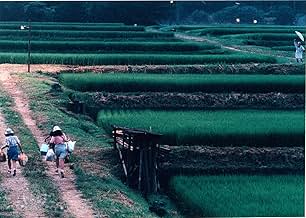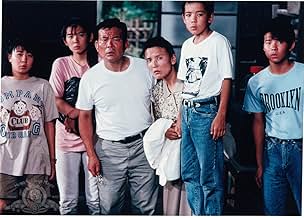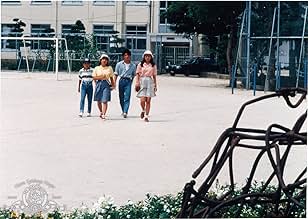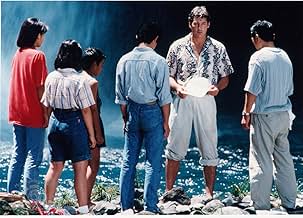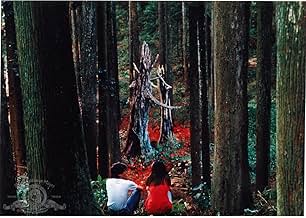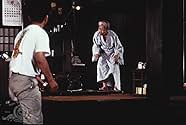AVALIAÇÃO DA IMDb
7,2/10
8 mil
SUA AVALIAÇÃO
Numas férias de verão, uma senhora sobrevivente da bomba de Nagasaki está com seus quatro netos reunidos e conta as lembranças do dia do ataque, que vitimou milhares de pessoas (60 mil e 80 ... Ler tudoNumas férias de verão, uma senhora sobrevivente da bomba de Nagasaki está com seus quatro netos reunidos e conta as lembranças do dia do ataque, que vitimou milhares de pessoas (60 mil e 80 mil em Nagasaki), entre eles o marido, pai e avó.Numas férias de verão, uma senhora sobrevivente da bomba de Nagasaki está com seus quatro netos reunidos e conta as lembranças do dia do ataque, que vitimou milhares de pessoas (60 mil e 80 mil em Nagasaki), entre eles o marido, pai e avó.
- Direção
- Roteiristas
- Artistas
- Prêmios
- 5 vitórias e 7 indicações no total
Richard Gere
- Clark
- (as Richâdo Gia)
Mieko Suzuki
- Minako
- (as Mie Suzuki)
- Direção
- Roteiristas
- Elenco e equipe completos
- Produção, bilheteria e muito mais no IMDbPro
Avaliações em destaque
I got really bore at first time when I saw this movie in theatre in 1992. Since I know Kurosawa is a perfectionist and usually try to say something important in his movie, I am sure there are some hidden message in his story other than the obvious. After twenty years, I decided to rent the out the DVD to examine the movie in detail. I was not disappointed and the true theme revealed to me immediately and I love it even the 3rd and 4th time. It was not just about the H-bomb incidence. It was a way for Kurosawa to tell the how young Japanese generation abandoned their own tradition culture and it is the American, once the enemy of Japan, are reviving it for the country. His second major theme was about old people who seen to be weak, senile and out of time, but when circumstance arise, they could still release plenty of energy to protect their youngs like how he still could such powerful movie like Rhphsody in August. I believe Kurosawa did this movie strictly for his fans to enjoy because unless you understand his thought, this movie is extremely boring at the surface, look as if it is produced by an old man out of touch with his time.
Although aware of Akira Kurosawa's standing in the realm of world cinema,I have never been a great fanatic of his films as most of them are Samurai films heavily laden with symbolic references to Japanese society.For me Akira Kurosawa's non Samurai films are better films as they speak of deeper issues like human sentiments.I watched "Rhapsody in August" directed by Akira Kurosawa film with rapt attention.As I was watching it after having watched "Madadayo",I could not help but comparing it both in style as well as content with that film.Both the films were made by Kurosawa when he was at the end of his career and may be for this reason he chose to make humanist stories.Rhapsody in August is a meaningful tale for all people whether they are young or old,American or Japanese.It is a film which shows how important a family is and how wisdom must be passed from the old to the young. Kurosawa has deftly tackled the question of Japan's Atomic bomb tragedy through plain words spoken by an old lady who tells her young grandchildren that with the passage of time all wounds are healed.Rhapsody in August tells us albeit in a non academic manner why it is important to live peacefully thereby avoiding war for the benefit of peaceful coexistence and human society.
A good movie is interesting and easy to understand. This is an absolute treasure of a film. A love letter to Nagasaki. An opportunity to see how deeply the atom bomb affected Japanese culture. An opportunity to see a number of the landmarks of the attack. And edited so wonderfully. Kurosawa always highly prized being able to tell the the story in images alone and understood how composition of shots increases content, and this movie has some very quiet sober shots that hit really really hard. It shows how we can fail to see things that are right under our noses for years and years. How things can happen that you never get over. I loved this movie!!!
I am a great fan of Kurosawa and I was so shock how bore this film was when I first saw it in theatre back in the 90s. I know Kurosawa always hide some message in his late movies and, after twenty years, I decided to rent the DVD again to examine the movie in detail. As I got into the movie, I start to understand what Kurosawa want to say. This movie is about how the younger Japanese are abandon their own culture and at the same time,ironically, it is the American, the one who dropped the atomic bomb in Japan,are reviving the Japanese tradition culture(G.Lucus and S. Spielberg are the one who produced the movie Kagamusa). Also, it is about aging as Kurosawa is part of the aging generation. Old people are being seen by young people as weak, illusions, and hopeless out of time and a burden, but when crisis came,(the storm in the movie) old people would show a trendous strength to protect the young one as the old lady in the movie standing up to the storm; it reflected that even Kurosawa, an old man, still could produces such thoughtful movie. I believe Kurosawa made this movie only for those who understand him and ,to me, this is one of his best even thought I love samurai movies.
"Rhapsody in August" (1991) is Akira Kurosawa's next to last film. It belongs to Kurosawa's final period of film-making when he moved away from themes such as samurai stories and historic eras of Japan and focused on issues such as the Second World War and its effect on the lives of ordinary people in Japan. The title of this film is a reference to August 9, 1945, when the atomic bomb fell on Nagasaki.
"Rhapsody in August" tells the story of four young girls and boys who visit their grandmother in a village near Nagasaki for their summer vacation. She is one of the survivors of the atomic bomb fell on Nagasaki during the war but she lost her husband in the atomic bomb attack. It is through her that her grandchildren learn about the atomic bomb attack and how it killed their grandfather. The children's parents have gone to Hawaii to visit the grandmother's elder brother, who had married an American woman and lived there since then.
The film shows how the children's indifference and disrespect for their grandmother gradually turns into understanding and respect for the sufferings she has gone through. We are allowed to explore the Nagasaki catastrophe through the grandmother's point of view and its aftermath through the children's view, who come to show much more understanding for the catastrophic event than their parents, who only seem to care about not raising the issue of the atomic bomb on fear that it might upset their American relatives and deprive them from their enterprise.
Although the film, in several occasions, makes direct criticism against the US over the Nagasaki atomic bomb attack, it is mostly through the grandmother's powerful and vivid recollections of the war, and the children's understanding of the events, that the depth of people's sufferings and the cruelty of the act -- the atomic bomb attack -- are seen. One great example is when the grandmother compares the mushroom cloud of the atomic bomb to a great eye watching over the city.
The grandmother is the living soul of all the pains caused by the atomic bomb and Kurosawa, all through the film and particularly in its iconic ending, well reminds us that time might not heal all wounds.
"Rhapsody in August" tells the story of four young girls and boys who visit their grandmother in a village near Nagasaki for their summer vacation. She is one of the survivors of the atomic bomb fell on Nagasaki during the war but she lost her husband in the atomic bomb attack. It is through her that her grandchildren learn about the atomic bomb attack and how it killed their grandfather. The children's parents have gone to Hawaii to visit the grandmother's elder brother, who had married an American woman and lived there since then.
The film shows how the children's indifference and disrespect for their grandmother gradually turns into understanding and respect for the sufferings she has gone through. We are allowed to explore the Nagasaki catastrophe through the grandmother's point of view and its aftermath through the children's view, who come to show much more understanding for the catastrophic event than their parents, who only seem to care about not raising the issue of the atomic bomb on fear that it might upset their American relatives and deprive them from their enterprise.
Although the film, in several occasions, makes direct criticism against the US over the Nagasaki atomic bomb attack, it is mostly through the grandmother's powerful and vivid recollections of the war, and the children's understanding of the events, that the depth of people's sufferings and the cruelty of the act -- the atomic bomb attack -- are seen. One great example is when the grandmother compares the mushroom cloud of the atomic bomb to a great eye watching over the city.
The grandmother is the living soul of all the pains caused by the atomic bomb and Kurosawa, all through the film and particularly in its iconic ending, well reminds us that time might not heal all wounds.
Você sabia?
- CuriosidadesAt the top of his career from starring alongside Julia Roberts in Uma Linda Mulher (1990), Richard Gere was earning millions of dollars per picture. Akira Kurosawa's company felt they were unable to pay his salary, to which Gere responded with "I'll work free for Kurosawa." Not wanting to take advantage of the actor, they offered him a modest sum, as well as offering to pay for all his travel expenses, including friends he wanted to bring with him to Japan while he worked. One of those friends included Cindy Crawford.
- Trilhas sonorasNobara (Heidenröslein)
Lyrics by Johann Wolfgang von Goethe (uncredited)
Music by Franz Schubert (as Shûberuto)
Performed by Hibari Jidou Gasshoudan (Hidetaka Yoshioka, Tomoko Ôtakara, Mieko Suzuki and Mitsunori Isaki)
Principais escolhas
Faça login para avaliar e ver a lista de recomendações personalizadas
- How long is Rhapsody in August?Fornecido pela Alexa
Detalhes
Bilheteria
- Faturamento bruto nos EUA e Canadá
- US$ 516.431
- Fim de semana de estreia nos EUA e Canadá
- US$ 26.771
- 22 de dez. de 1991
- Faturamento bruto mundial
- US$ 517.538
- Tempo de duração
- 1 h 38 min(98 min)
- Cor
- Proporção
- 1.85 : 1
Contribua para esta página
Sugerir uma alteração ou adicionar conteúdo ausente


